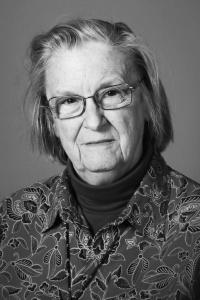
Honoring the Women Who Were Trailblazers in Environmental Health
Women's History Month, observed annually in March, is a time to celebrate the contributions of women throughout history. Today we want to celebrate women who have made significant strides in pursuing environmental justice. Their work has helped us better understand the natural world, identify environmental challenges, and develop solutions to protect our planet. Their legacies inspire us to continue the work of advancing environmental science and inclusivity in science.
JoAnn Tall

JoAnn Tall is an environmental activist and member of the Oglala Lakota tribe in South Dakota who has dedicated her life to fighting for environmental justice for her community. Her activism began with her work protesting uranium mining and proposed nuclear testing in the Black Hills area near the Pine Ridge Reservation where Tall and her family live. Her advocacy was recognized in 1996 when she received the Goldman Environmental Prize, which celebrates grassroots environmental activists from around the world. Tall co-founded the Native Resource Coalition, a think-tank dedicated to educating the public on land preservation and health issues.
She has been actively involved in advocating for the rights of Indigenous people and the protection of their sacred lands. Throughout her life, Tall has had several victories in her fight for environmental justice and has continued to inspire and empower others to take action toward creating a more sustainable and just world. She serves as a role model for Indigenous communities and environmentalists around the world
Lois Gibbs

Lois Gibbs is an American environmental activist who is best known for her work as the leader of the grassroots movement to relocate over 800 families from a neighborhood that was contaminated by toxic waste. Gibbs discovered that the cause of the high rates of health issues in her community was due to 21,000 tons of chemical waste buried below the neighborhood. She led a successful campaign to relocate the residents and draw attention to the issue of toxic waste sites throughout the United States.
Later in her career, Gibbs founded the Center for Health, Environment, and Justice, which supports grassroots movements in the fight for environmental justice. She has been recognized for her contributions to the environmental movement with numerous awards, including the Goldman Environmental Prize in 1990. Gibbs is a powerful advocate for environmental justice and continues to work towards protecting communities from the harmful effects of environmental pollution.
Visit the Center for Health, Environment, and Justice
Dr. Sandra Steingraber

Dr. Sandra Steingraber is an American biologist, writer, and environmental activist who has dedicated her career to exploring the links between human health and the environment. She is best known for her work on environmental toxins and their effects on human health, particularly cancer.
Since publishing her first book, which examines the links between environmental toxins and cancer, Steingraber has been a leading voice in the environmental movement, speaking and writing about the need to address the root causes of environmental problems and advocating for policies that protect public health and the environment.
She has received numerous awards for her work as an environmental activist, focusing on air and water pollution, climate change, and the impacts of industrial agriculture on the environment.
Learn more about Dr. Steingraber
Dolores Huerta

Dolores Huerta is a civil rights activist and labor leader who has dedicated her life to fighting for the rights of workers, immigrants, and marginalized communities. She co-founded the United Farm Workers (UFW) with Cesar Chavez. As the union's vice president, Huerta was instrumental in organizing strikes, boycotts, and other forms of collective action to improve the working conditions and wages of farm workers, including eliminating exposure to harmful pesticides. In addition to fighting for farmworkers, she has been a tireless advocate for women's rights and was a founding member of the National Organization for Women (NOW) in 1966. She has fought for the rights of immigrant communities, working to secure better access to education, healthcare, and political representation.
Huerta has received numerous awards and honors for her work, including the Presidential Medal of Freedom in 2012, and continues to inspire and empower people around the world through her activism and advocacy. Today, at the age of 92, she remains an inspiration to activists and organizers worldwide, and her legacy continues to inspire generations of young people to pursue social change.
Visit the Dolores Huerta Foundation
Dr. Elinor Ostrom

Dr. Elinor Ostrom was an American political economist and a pioneer in studying common-pool resources, such as fisheries, forests, and groundwater. She was widely regarded as a leading authority on the management of shared resources. Her work showed that people could and do successfully manage common-pool resources through a variety of self-organized and decentralized arrangements, including community-based management systems and user associations.
In 2009, Ostrom was awarded the Nobel Prize in Economics, becoming the first woman to receive the prestigious award. Her citation acknowledged her groundbreaking contributions to the study of economic governance, particularly in the context of natural resources. Throughout her distinguished career, Ostrom authored or co-authored over 200 publications, including books, book chapters, and journal articles. Her work on the governance of common-pool resources challenged the conventional wisdom that these resources were doomed to overuse and depletion and argued that under certain conditions, communities could effectively manage these resources through collective action and self-governance.
Ostrom's influential work on the design of institutions for collective action has provided insights into how communities can effectively manage shared resources and has inspired a generation of scholars to examine the social, economic, and political factors that shape collective action and resource governance. Her groundbreaking contributions to the study of common-pool resources and collective action continue to inspire scholars and policymakers around the world.
Rachel Carson

Rachel Carson was an American marine biologist, conservationist, and writer who is credited with launching the modern environmental movement through her groundbreaking book, "Silent Spring." Published in 1962, the book exposed the harmful effects of pesticide use on the environment and public health. Despite backlash from the chemical industry, Carson’s book inspired opposition, and the eventual banning, of DDT and the creation of the U.S. Environmental Protection Agency. It also spurred a national conversation about the dangers of pollution and the need for greater environmental protection, becoming a foundational text for the modern environmental movement.
Throughout her career, Carson advocated for conservation and criticized the rampant use of pesticides and other harmful chemicals in the environment. Her work helped shape public opinion on environmental issues and inspired a generation of activists and scientists to take action to protect our planet. Carson's legacy lives on today, as her work continues to influence the environmental movement and inspire efforts to protect our natural world.
Learn more about Rachel Carson
As we celebrate Women's History Month, let us remember and honor these women's legacies and continue to work towards a more environmental and sustainable world!

Angelina is an EHSC editorial assistant for the communications department and an undergraduate student at UC Davis studying Human Development. She is an aspiring writer with a focus on science communication.